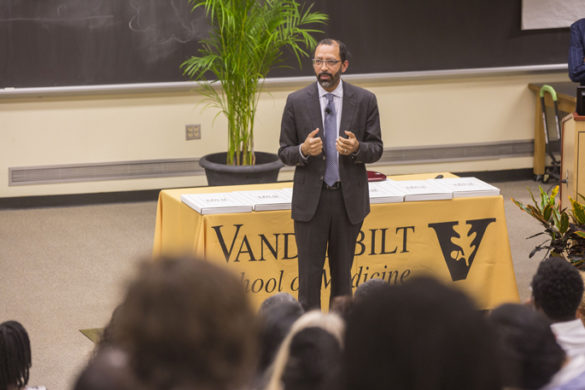
As the guest speaker for the 16th annual Levi Watkins Jr., M.D., Lecture, Levi Garraway, M.D., Ph.D., outlined the influence his family had on his storied career, particularly the impact of his uncle, for whom the lecture is named.
Garraway, senior vice president of Global Development and Medical Affairs for Eli Lilly and Co., grew up in Columbus, Ohio. His grandfather dedicated his life to education, becoming the president of Alabama State University. His grandmother was a preacher’s daughter who instilled the importance of faith in the family’s life.
“Education, faith and hard work were the essence of my grandfather,” Garraway said.
His mother, Annie Mae Watkins Garraway, earned a Ph.D. in mathematics, which Garraway called his worst subject throughout his school years. His mother became a department chair at AT&T Bell Labs.
In 1970 his uncle, Levi Watkins Jr., was the first African-American student admitted to and graduate from Vanderbilt University School of Medicine (VUSM).
“It took courage to admit him, undoubtedly in the mid-1960s, I’m sure amidst the winds of controversy blowing in the South. I think Vanderbilt gets a lot of credit for that. My family is very grateful. The legacy of that courage can be seen in the audience now. This is an institution that recognizes there is talent everywhere, regardless of background,” Garraway said.
When his uncle became a Halsted scholar at Johns Hopkins University, Garraway’s family drove from Columbus to Baltimore for an event in his honor.
“This was one of the first times I realized my uncle wasn’t just my uncle. He was doing something very impressive. Over time, as he started to become successful as a cardiac surgeon, we started to ask, ‘what is a surgeon’? The impact started to make me and one of my sisters start to probe what medicine was … and realized we could do this.
“My uncle was the influence that caused me to go into medicine, but my father is the influence that caused me to be excited about science. My dad was a plant biologist at The Ohio State University and was passionate and dedicated about science.”
Garraway’s speech “How Dreams Come True: Reflections on the Physician-Scientist Career Path” outlined seven principles that have guided him throughout his career: find work you love and do it well; mentorship is important; ask interesting questions; pursue innovation aggressively; be rigorous and evidence-based; be prepared; and be a good citizen.
“This now harkens back to my uncle and his life. He wasn’t just an amazing cardiac surgeon, although he was; he wasn’t just a dedicated mentor, but he cared about society. He was willing to take a stand for issues of social justice, speaking truth to power, pushing back on areas where he believed there were fundamental problems that need to be fixed. That was a huge part of who he was and why we remember him.
“But he was only able to do that credibly having first established himself as a credible expert in scholarship. He was an excellent cardiac surgeon, and that gave him the credibility to speak out strikingly about injustices.”
André Churchwell, M.D., Senior Associate Dean for Diversity Affairs, welcomed everyone to the lecture and presented the Levi Watkins Jr., M.D., awards to the following recipients for their contributions to diversity: Stephanie E. Spottswood, M.D., MSPH (faculty/administration); Debra Dixon, M.D., M.S., and Victoria Adeseye, M.D., (house officers); Jiun-Ruey Hu and Jacqueline Harris (medical students); and Romell Gletten (graduate student).












